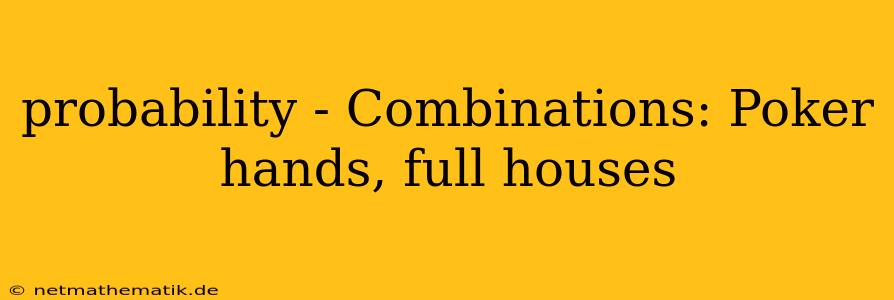Poker, a game of skill and chance, relies heavily on understanding the probabilities associated with different hand combinations. Among the most intriguing and strategic hands is the full house, a powerful combination that offers a high likelihood of winning. This article delves into the fascinating world of probability, specifically exploring the concept of combinations and applying it to the calculation of the probability of getting a full house in poker.
Understanding Combinations: The Foundation of Poker Probability
Before delving into the specifics of full houses, it's essential to grasp the concept of combinations. In mathematics, a combination is a selection of items from a set where the order of selection doesn't matter. Poker hands are prime examples of combinations since the order in which you receive your cards doesn't affect the hand's value. For instance, a hand with a King of Hearts, Queen of Diamonds, and Jack of Clubs is the same as having the Jack of Clubs, Queen of Diamonds, and King of Hearts.
To calculate the number of combinations, we use the following formula:
nCr = n! / (r! * (n-r)!)
Where:
- n represents the total number of items in the set.
- r represents the number of items being chosen.
- ! denotes the factorial, which means multiplying a number by all positive integers less than it (e.g., 5! = 5 * 4 * 3 * 2 * 1).
Let's illustrate this with an example. Imagine a deck of 52 cards, and we want to find out how many different ways we can choose 5 cards (a standard poker hand). Applying the formula, we have:
52C5 = 52! / (5! * (52-5)!) = 2,598,960
This means there are over 2.5 million different possible poker hands!
Calculating the Probability of a Full House
Now, let's move on to the task at hand – determining the probability of getting a full house. A full house consists of three cards of one rank and two cards of another rank (e.g., three Queens and two 7s). To calculate its probability, we need to follow a structured approach:
-
Determine the number of ways to get three of a kind:
- Choose one rank out of 13: 13C1 = 13 ways
- Choose three cards of that rank out of four: 4C3 = 4 ways
- Choose a different rank for the pair: 12C1 = 12 ways
- Choose two cards of that rank out of four: 4C2 = 6 ways
-
Calculate the total number of favorable outcomes:
- Multiply the number of ways for each step: 13 * 4 * 12 * 6 = 3744 ways
-
Calculate the total number of possible hands:
- We already know this from our previous example: 52C5 = 2,598,960
-
Calculate the probability of getting a full house:
- Divide the number of favorable outcomes by the total number of possible hands: 3744 / 2,598,960 = approximately 0.00144
-
Express the probability as a percentage:
- Multiply the probability by 100%: 0.00144 * 100% = 0.144%
Therefore, the probability of getting a full house in poker is approximately 0.144%, meaning you're likely to get this hand about once in every 694 hands.
The Importance of Probability in Poker
Understanding the probability of different poker hands is crucial for several reasons:
-
Strategic Decision-Making: Knowing the probability of getting a certain hand helps players make informed decisions about betting, folding, or raising. If a player knows the probability of improving their hand is low, they might be more inclined to fold.
-
Evaluating Opponents: Players can use probability to assess their opponents' hands and adjust their strategies accordingly. If an opponent is betting aggressively, it might suggest they have a strong hand, and a player might choose to fold.
-
Bankroll Management: Understanding probabilities helps players manage their bankroll effectively by making calculated risks. If a player knows the probability of winning a particular hand is low, they might be more conservative with their bets.
Conclusion
In conclusion, understanding the concepts of combinations and probability is essential for success in poker. The probability of getting a full house, while not extremely high, is still a valuable hand that can offer a significant advantage in the game. By studying and applying these principles, players can enhance their strategic decision-making, evaluate opponents more accurately, and manage their bankroll effectively. The world of poker is a complex and fascinating one, and the understanding of probability, particularly in relation to combinations, is the key to unlocking its secrets.
